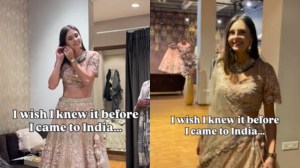Remember our founding mothers
As was expected, the Lok Sabha speaker’s initiative failed to bring about a consensus on the Women’s Reservation Bill. Although I ...

As was expected, the Lok Sabha speaker’s initiative failed to bring about a consensus on the Women’s Reservation Bill. Although I am all for the Bill in its present form, women activists must perceive the ground reality. It is not very practical for women to underestimate the opposition from male politicians in Parliament. Given the present instability thanks to political coalitions, to expect one-third of the male members of the House to accept political hara-kiri is unrealistic.
I have maintained for a long time that the alternative of double-member constituencies will meet both the requirement of ensuring one-third representation for women without, at the same time, denying seats to male members.
Incidentally, double member constituencies existed up to the 1957 general elections for general and scheduled castes. We had the famous case of former president, V.V. Giri, contesting from a double-member constituency but failing to get elected because the maximum votes were obtained by a scheduled caste candidate. The other reserved seat went to another scheduled caste candidate even though he had got a less number of votes than Giri.
Now that government has asked the Delimitation Commission to allocate seats on the basis of 2001 Census, which is 102 crore as against the previous 1971 census figure of 54 crore, it means that Lok Sabha seats can easily be increased to 750. The British Parliament, after all, has over 600 members. These 750 may be dovetailed into the 250 double-member constituencies which will account for 500 members, half of whom (250 —ie, one third) will be women.
There is another advantage. If the seats are not increased, the result will be that each Parliament seat will have a population of 20 lakh, which is far too unmanageable. Thus double-member constituencies must be those constituencies that have a population of 15 lakh or more. As there will now be two candidates of the same party contesting the election, the responsibilities entailed can be shared by both of them. The other 250 seats will have a population per seat of about 10 lakh.
The argument for a sub-quota among women is a red herring, tossed about by male members who are in fact against women occupying positions of power. There are about 200 OBC candidates in the present Lok Sabha. It cannot be denied that it is only because of the caste configuration that they have been elected and not because of any particular public service they have rendered. Similar considerations will also ensure that OBC women candidates come to power.
Women are not asking for grace and charity. Their contribution to the cause of nation building can be said to exceed that of men. They have also played a vital role in the making of the Constitution, one that lays great emphasis on the development and empowerment of women. And, yet, not only
among lay men but also in judicial circles, we continue to repeat in a parrot-like fashion that the Constitution was given to us by our “founding fathers”.
This phrase, incidentally, is a straight lift from US court decisions, which rightly refer to “founding fathers”, since there were no women members in the American Constitutional Convention. But that analogy does not apply to India because we had very distinguished women members in the Constituent Assembly.
Our Constitution, therefore, is a product of the philosophy and sacrifice of both our founding fathers and mothers. I wish in future that this thoughtless injustice of non-attribution perpetrated on the “mothers of our Constitution” is not repeated. Let the present generation make amends for the past injustice to our founding mothers by this small step of passing the Women’s Reservation Bill.
I firmly believe that reservations for women in the country’s politics would check the dubious influence that men have brought to it. It will help raise social consciousness in our political life and help break the present nexus between criminals and politicians that is posing a real danger to our democracy.
- 01
- 02
- 03
- 04
- 05































